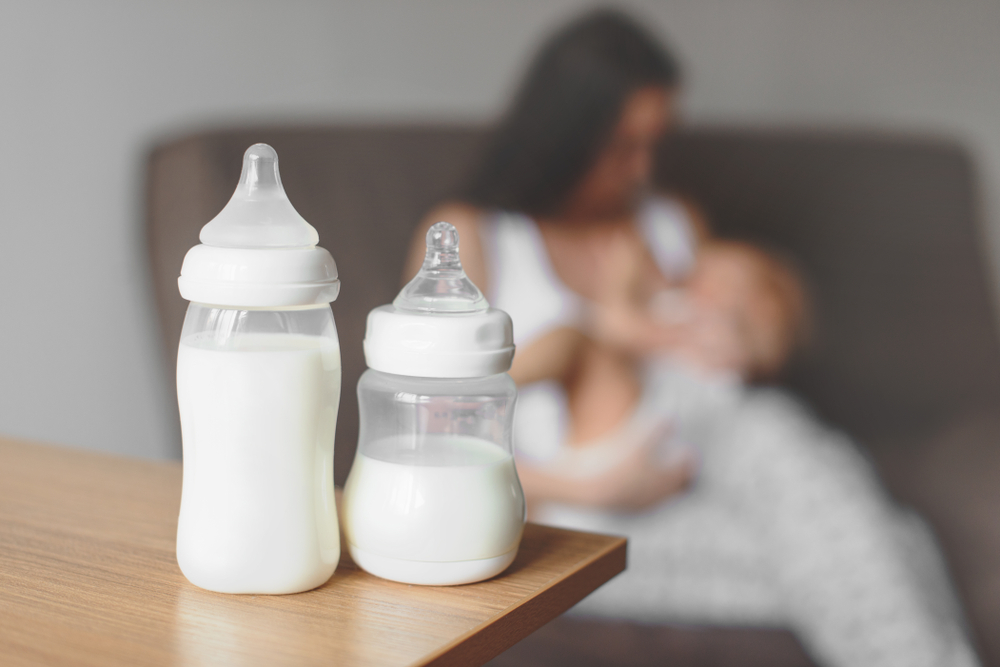
Whether formula feeding or breastfeeding, every new mom knows that fed is best. While there are many benefits of breastfeeding, that doesn’t mean there aren’t advantages to using baby formula. And, as a parent of a newborn, having options is great.
Sarah Musselman, RN, a lactation specialist at OSF HealthCare, shared some of the dos and don’ts of bottle feeding.
Benefits of bottle feeding
One of the biggest advantages of using a bottle is the flexibility to share parenting duties. Using baby formula means that feeding the baby isn’t just a responsibility for the mom.
Formula can even be used as a supplement for breastfeeding, especially if a mom doesn’t make enough breast milk. Plus, formula feeding is an essential option for moms who can’t breastfeed.
“You can do any combination of breastfeeding and formula. You can even mix formula and breast milk in the same bottle,” Sarah said.
What is baby formula made of?
Baby formula was invented in Germany in 1865 by a man who was especially passionate about improving nutrition in communities where food was scarce. The first formula he made included cow’s milk, wheat flour, malt flour and potassium bicarbonate.
“Baby formula is made to replicate breast milk as closely as possible,” Sarah said. “It isn’t a perfect match, but it’s close.”
Today, it has many of the same vitamins and nutrients that breast milk has to support healthy growth and development in babies, including iron and protein.
Not all baby formulas are the same, so talk with your baby’s pediatrician if you’re not sure what to choose. Most baby formulas nowadays contain cow’s milk, but there are other options, like soy-based or protein-hydrolysate formula if your baby has a cow’s milk sensitivity. Formula can come in powder, liquid or ready-to-eat form.
How do I bottle feed a baby?
Always follow the instructions on the can or bottle, including cleaning the area where you’re preparing the bottle and washing your hands. You can mix baby formula with any safe drinking water, including tap or nursery water. Don’t over- or under-dilute formula.
Many people believe that the water the formula is mixed with poses a risk to baby’s health and safety. However, it is the formula powder that poses a very small risk from possible production error in the factory. The risk of infection is small, but it can be catastrophic. Ready-to-feed formula is the safest – especially for newborns – because it’s sterile.
When feeding your baby, cradle them close to your chest and hold the bottle at an angle so the baby can easily suck the milk. Make eye contact and switch which side they’re held on. Don’t ever prop the bottle on something and walk away. That will likely create a fussy, gassy baby.
Formula can sit out after it’s been prepped for about an hour. But, once a baby has had the bottle in their mouth, it shouldn’t be saved for the next feed because saliva can cause bacteria growth on the bottle nipple.
How much formula a newborn eats
“Feed your baby on cue,” Sarah said. “Babies, whether bottle or breast fed, should eat about 25-35 ounces a day.”
Babies don’t need those big bottles like we commonly think, especially when they’re first born. Their stomachs are very tiny at birth, so they don’t need a lot to fill them up. As they grow and develop, their stomach gets bigger, and they’ll want more formula to feel full.
In the first few days, babies only really need about half to an ounce of formula per feeding about eight-12 times a day. After those first few days until about two months, babies will gradually increase to needing about three ounces per feeding.
“Babies are sort of like us as adults. Sometimes we just want a snack, and sometimes we want a whole buffets’ worth of food. Sometimes we just want a drink,” Sarah said. “They’ll eat different amounts at different times throughout the day, and that’s perfectly OK.”
It’s a good idea to track how much and when your baby eats throughout the day. It can be hard to remember how often a baby gets fed, especially with new mom-brain or if the baby is fed by different grownups throughout the day, like dad, grandma or babysitter. Having a written chart or diary can help to keep everyone on the same page.
How long do babies drink formula?
Babies typically drink exclusively formula for the first six months. Once they start on solid foods, they may not be as hungry for a bottle, but they still need some formula as a supplement.
Babies should drink formula until age 1 – or longer if the pediatrician recommends – and should switch to whole cow’s milk or nut milk after their first birthday. But always be sure to talk to your pediatrician about what’s best for you and your baby.






